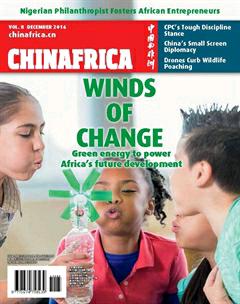Africa’s COP
IN retrospect, the 22nd Conference of Parties (COP22) to the United Nations Framework Convention on Climate Change (UNFCCC), which took place in Marrakech, Morocco, in November closed a landmark year for climate change initiatives. Agreements to phase out hydrofluorocarbon (HFC) gases and cap emissions that worsen global warming, as well as the rapid ratification of the Paris Agreement, which came into force on November 4, were all reached.
Despite U.S. President-elect Donald Trumps description of climate change as being a “hoax,” and his election utterings of canceling the U.S. ratification of the Paris Agreement, COP22 went ahead in a positive light and adopted a proclamation calling for political commitment at the highest level, along with solidarity in the fight against climate change. COP22 President and Moroccan Minister of Foreign Affairs Salaheddine Mezouar was upbeat and determined in what was seen as an African COP. Mezouar said it was time to put the devastating impact on Africas weather patterns, on agriculture specifically, at the center of all climate change debate.
An example of Africas Sahel region was made showing how countries there, such as Mali, Chad and Niger, have been through continual devastating drought since the mid-1980s. The damage this has done to crops, food security, ecosystems and the local economies is debilitating. A rise in temperature, land degradation, deforestation and water stress are all role players in Africas climate change challenge.
In line with this, the United Nations Economic Commission for Africa (ECA) noted that the African continent, which had a dedicated pavilion at COP22, is among the most vulnerable to the holistic impact of climate change. This is compounded by the fractured economic growth and poor adaptive capacity of the continent. What is needed to remedy this is increased support of a long-term nature to enable equilibrium between climate mitigation, being action taken to eliminate risks of climate change on human life, and climate adaptation, or how a system adapts to climate change.
Fortunately the Paris Agreement addresses these very factors, which is why the ratification of this agreement is so important for Africa.
Along with other nations, China will play an important role in this agreement with its planned $2.93 billion fund for South-South cooperation. The fund will be used to help establish low-carbon model parks, implement mitigation and adaption projects, and train personnel in developing countries.
The COP22 proclamation did reaffirm the target of generating $100 billion to assist developing countries to cope with climate change. Sadly, no blueprint or timeline for developed countries to come up with the funds was made available, despite COP22 being dubbed the “COP of action.”
Mezouar said that hosting COP22 in Marrakech was in itself a demonstration of a collective Africa committed to the global push in fighting climate change. He said it emphasizes the desire for Africa to take its destiny in its own hands, reduce its vulnerability and strengthen its resilience.
However, being in charge of your own destiny and not having the resources to shape that destiny are two very different sides of a coin. If, as Mezouar said, the momentum generated by progress made in fighting climate change this year is “irreversible,” then the pledges of financial and related support from the developed world should also be irreversible.

